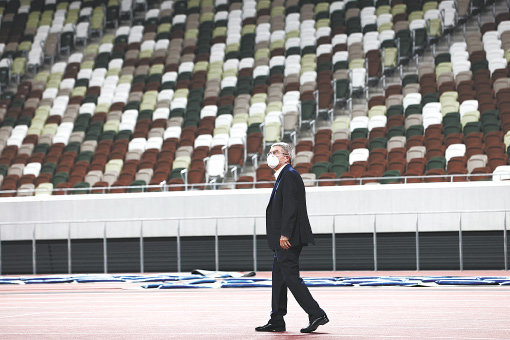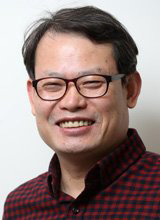Will COVID-19 vaccines save Tokyo Olympics?
Will COVID-19 vaccines save Tokyo Olympics?
Posted November. 27, 2020 07:42,
Updated November. 27, 2020 07:42


“In order to protect the Japanese people and out of respect for the Japanese people, the IOC will undertake great effort so that as many (people) as possible Olympic participants and visitors will arrive here (with a) vaccine, if by then a vaccine is available,” said IOC President Thomas Bach on Nov. 16 in a meeting with top-ranking Japanese officials, according to The Associated Press.
Visiting Japan from Nov. 15 to 18, President Bach met up with Japanese Prime Minister Yoshihide Suga, Tokyo Olympic Organizing Committee chairman Yoshiro Mori, and former Japanese Prime Minister Shinzo Abe and looked around major venues for the Tokyo Olympic Games scheduled next year.
IOC President Bach, however, did not participate in the Seoul Peace Prize ceremony held at the end of last month in South Korea although he was granted the award in recognition of contributing to the formation of a unified team of the two Koreas in the 2018 Pyeongchang Olympic Winter Games. The Seoul Peace Prize was established in 1990 to celebrate the spirits of the 1988 Seoul Olympic Games that helped promote global harmony between the Eastern and Western worlds. President Bach replied that the spread of COVID-19 across Europe prevented him from attending the ceremony in South Korea.
Meanwhile, the IOC president pushed ahead with his visit to Japan with the COVID-19 pandemic only worsening across the globe. It is deemed by experts that he seemingly intends to reassure Japanese citizens and sponsors that next year’s Olympics will open seamlessly.
Before President Bach’s arrival in Japan, it was reported that U.S. pharmaceutical company Pfizer succeeded in developing a COVID-19 vaccine. Pfizer’s development of the vaccine may be good news for the IOC, making it believe that the Olympic Games will go smoothly with the coronavirus beaten up.
However, Bach’s words of choice, “in order to protect the Japanese people,” carry a subtly inconvenient nuance. It may be partly understandable that he made the remarks to alleviate public concerns among Japanese people during his visit. Also, he might have worried that another wave of the coronavirus would rise due to an inflow of overseas visitors to Japan. However, it would have been appropriate for him to say “in order to protect people from all over the world” instead of specifically commenting on the public health and safety of Japanese people. There is a likelihood that tens of thousands of athletes, participants and spectators coming from every part of the globe may spread the virus. Equally possibly, Japanese citizens may transmit the virus. Not only Japanese people but also everyone else who joins the Olympics should stay safe and intact amid the pandemic. It may be a careless argument that only overseas participants may victimize Japanese people by spreading the virus. Thus, all-out quarantine measures should been taken to protect not only Japanese citizens but also athletes and spectators coming from other countries.
It is not mandatory for every Olympic participant to get vaccinated, which was referred to by President Bach. However, the IOC said that it will do its utmost to make it happen. Then, will it be possible for everyone during the Tokyo Olympics to get a vaccine? Global news media outlets including The Associated Press report that not all athletes want to get vaccinated because it is too early to say that the vaccine is safe enough to be available on the market with a few more test steps to go for clinical practice although clinical testing on the vaccine is gaining momentum. It may cause unknown side effects and no one is sure in what way athletes’ health conditions may be affected.
“We had a meeting to come up with follow-up measures after President Bach commented on the vaccine. We will wait and see until the vaccine becomes available for market distribution as related tests have not yet been completed,” said an official at the Korean Sport & Olympic Committee. “Then, we may be able to decide whether to purchase vaccines and get athletes vaccinated.” “We do not know about detailed information on the vaccine so we are not sure what effect it can have on athletes,” according to an anti-doping expert.
All things considered, it is too early to talk about the effects of the vaccine on athletes’ performance and safety-related matters. It takes some time to confidently determine COVID-19 vaccination for Olympic athletes.
Even as the vaccine turns out to be safe, it may be difficult to ensure enough quantities of vaccines. Experts have different views of how the vaccine costs – from just a few thousand won to tens of thousands. It may be a costly choice to make for those living poor countries. It is highly likely that some countries will fail to secure sufficient amounts of vaccines because everyone across the world will be hell-bent on acquiring their shares. Then, there should be discussion on what has to be done with athletes who have no access to the vaccine. Furthermore, it is unsure if the vaccine can guarantee security and safety to the perfect degree during the Tokyo Olympic Games. Having access to the vaccine may help open next year’s Olympic event but there remain enormous issues to tackle afterward.
Won-Hong Lee bluesky@donga.com
Headline News
- Joint investigation headquarters asks Yoon to appear at the investigation office
- KDIC colonel: Cable ties and hoods to control NEC staff were prepared
- Results of real estate development diverged by accessibility to Gangnam
- New budget proposal reflecting Trump’s demand rejected
- Son Heung-min scores winning corner kick







